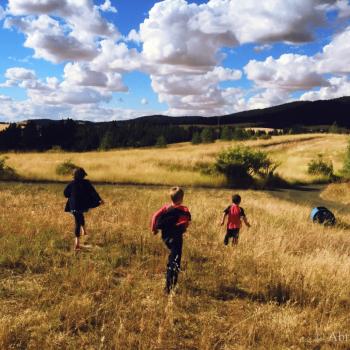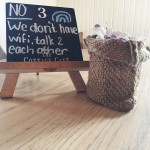
Last Monday, I was talking to my therapist about the recent upset caused by my investigative opinion article on gorilla care as a Christian. As someone who rarely follows the news, 1) I had no idea this subject had been so controversial or done to death. This put me in the unfortunate place of speaking to an audience who had already decided their stand and were bored with or hostile to the idea of revisiting the case for funsies and 2) my sense of humor can be difficult to detect and is often mistaken as aggression. I’d say it was because I’m a genius but I’m actually just a bit off. Ben gets me, but we’ve been together 14 years now.
We all expect people to change, but it may take folks by surprise if the change is rapid. In my case, we recently switched up the PTSD medication. It has only been just over a month, but I feel more like myself than I have since before I had babies some 11 years ago. I don’t feel deliriously tired or extremely stressed anymore. I am beginning to feel creative and enjoy my hobbies again. I am changing and it is good. It also makes my bi-polar problems more pronounced because I actually feel happy, which means I have more noticeable ups and downs that I am having to learn to manage again. But if you’ve only known me for a couple of years or haven’t been particularly close, all this change may seem alarming and/or annoying. My doctor put it this way; if you’ve been too weak to get a glass of water so long that people only know dehydrated you, they may not recognize hydrated you who is stronger and less survival mode-y. I’m paraphrasing. So there’s that…also my inability to handle criticism well (not helpful discussion and respectful disagreements — I usually do ok with those and welcome them) plays into it
We all know that personal boundaries are something I really suck at, and we also know that I’ve had my fair share of being taken advantage of, abandoned or betrayed. Without going into it here, let’s just say I tend to hear unkind words much louder than kind words. Part of this is a survival technique I developed as a kid, part of it is a lacking resiliency, and part of it is poor confidence and most likely, a bit of average sin as well. Dr. pointed out to me that given my history, it is understandable for me to be overly sensitive. That my upset was a sign of caring, not anger. If I didn’t care about certain commenters, it wouldn’t hurt so much. He also reminded me that people who are close friends will be aware of my weaknesses when they interact with me, leaving less room for misinterpretation and more worth to their insights to me. This is one of those negatives about social media, it gives us a false sense of knowing others. Instead of feeling inferior and guilty about the recent kerfuffles, Dr (and my hubby) encouraged me to set better boundaries for myself.
- Boundaries are not about the other person. You can’t change others, but you can change yourself and your situation. Putting reasonable boundaries in place for yourself is an acknowledgment that you are secure in in Christ, recognizing your worth in His eyes, and your weaknesses such as limited abilities, time and energy. As the saying goes, when you say “yes” to one thing, you are saying “no” to something else. We aren’t superpeople.
- Boundaries are not about burning bridges, building walls or alienation. They are protecting you and other people. When a relationship reaches a point when it is not mutually edifying, it isn’t a friendship anymore. It could be unhealthy, argumentative, manipulative, tearing down or may simply be better classified as a trusted counselor or mentor situation. The latter is one that will take energy away from one person to restore the other, but not work the other direction. These types of relationships are healthy in their place, but they are not a mutual friendship.
- Boundaries are healthy, not selfish. Of course, we can make anything selfish, but the purpose of boundaries is to protect a person from burning out, over-extending themselves and consequently struggling with bitterness. Taking those preventative steps makes it much easier to be productive, better organized, more clear-headed and helpful to others who can benefit the most from what you have to offer.
Social media has been a part of my life for so and I usually really enjoy it. It gives me an opportunity to get to know people I wouldn’t normally, bless friends and those in need, interact with friends when I can’t be with them, see pictures of all my awesome nieces and nephews, and it has an added benefit for me since it can be quite therapeutic and constructive to blog (a weird sort of talk therapy). What I talk about also helps some others know that they aren’t alone and give them a person to reach out to when they need prayer, a shoulder to cry on or help getting help.
Of course, whenever you put yourself out there, there will be lovers, haters and people who don’t give a crap about you. This is all par for the course and something I had several years of experience navigating in my years as a paid moderator in (non-Christian) mom forums. I’ve learned to shrug off strangers unedifying thoughts, but I am still (often) hypersensitive to a loved one’s opinion. Which isn’t a sin in of itself, although it can flirt with idolarty, but also can be emotionally draining and time-consuming.
So how do you set healthy boundaries on social media?
Dr. did not recommend unfriending on social media unless there have been malicious attacks* (verbal abuse, stalking, bullying). Instead, he told me to ask myself whether a facebook friend was blessing me (either by encouragement, kindness or helpful critique) and to prioritize those people as the ones I interact with. For others, he said it is a healthy boundary to use filters to control their interaction on my page. This helps me keep tabs on relationships I am looking to strengthen while not becoming the proverbial door mat. It also is helpful in protecting me from getting in the lost black hole that is Facebook (oh look! A kitten!). Placing this kind of soft boundary frees me up to still engage with acquaintances and distant friends without alienating them or shutting them off, but also helps my time online to be productive and free of unhealthy interactions. Drs (not sure if it was mine or the Boundaries books guys) say that unless you put up boundaries with anger, careless and bitterness, there is no reason to feel guilty for using this method of resource conservation.
“But really,” you may say, “How does that actually work?!” I have a couple tricks up my sleeve and as I research this subject better, I will share the methods and tips I find. If you’d like to join me in learning more about boundaries, don’t forget to enter my giveaway for the first Boundaries book by Doctors Cloud and Townsend. In the mean time, I’d love to hear the ways you’ve found to encourage edifying relationships on social media.
XOXO,
Abra
*In these instances, it is vitally important to forgive that person whether they ask for it or not. But realize that reconciliation is a two-way street. If someone wronged you, saying I’m sorry isn’t enough. The offender should work to restore the fellowship that they breached. Restoration and reconciliation is a pa de deux, not a solo. Do not attempt one alone. When you forgive someone, it is not to forget the offence, but to protect yourself from being abused again. Sometimes this means you need to unfriend, block and avoid that person alltogether, depending on the situation. In the case of phsyical violence, this means you must call the cops (or a trusted friend) to help.












